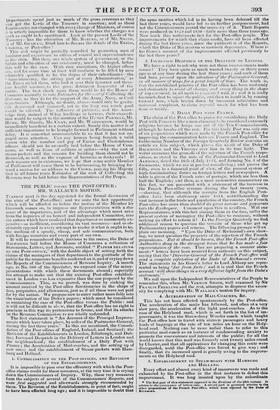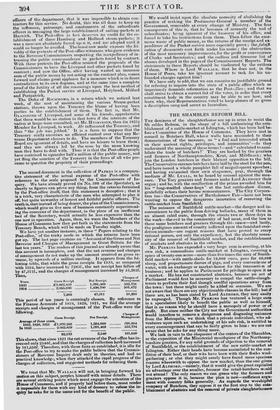TIIE PUBLIC versus THE POST-OFFICE; MR. WALLACE'S MOTION.
TUESDAY next is the day appointed for the formal discussion of the state of the Post-office; and we seize the last opportunity which will be afforded us before the motion of the Member for Greenock comes on, to impress our Representatives with a due sense of its importance, and of the advantage which must arise from the inquiries of an honest and independent Committee, into the causes which have rendered that department so enormously ex- pensive—so inefficient, considering its vast resources—and so ob- stinately opposed to every attempt to render it what it ought to be, the medium of a speedy, cheap, and safe communication, both with foreign countries and every part of our own.
It will be remembered that, previous to the recess, the Duke of RICHMOND laid before the House of Commons a collection of Statements, Letters, and Accounts, entitled " PAPERS RELATING TO THE POST-OFFICE;' with the double object of setting forth the claims of the managers of that department to the gratitude of the public for the numerous benefits conferred on it, and of crying down the Reports of the Commissioners of Revenue Inquiry. A month ago, in No. 300 of the Spectator, we exposed some of the misre- presentations with which these documents abound ; especially the attempt to make out that the existing Post-office establish- ment in London was less expensive than the one proposed by the Commissioners. This, as we proved, was done by sinking the amount received by the Post-office functionaries in the shape of fees, perquisites, and allowances, just as if all these were not paid for by the nation. We propose now to enter rather more fully into the examination of the Duke's papers; which must be considered as containing the case of the Post-office versus the Public: and it will not be difficult to sbew, that the Post-office has no right to proclaim in this way its pretensions to favour, and that its attacks en the Revenue Commissioners are wholly unfounded.
The first statement is "An Account of the Principal Improve- ments which have taken place, by order of the Postmaster-General, during the last three years." In this are mentioned, the Consoli- dation of the Post-offices of England, Ireland, and Scotland; the Revision of the Establishments in London, Edinburgh, and Dub- lin; Increased Despatch in the Delivery of Letters in London and the neighbourhood; the establishment of a Daily Post with France ; the Acceleration of Mail-coaches, and the setting up of new ones; and the establishment of Steam-packets with Ham- burg and Holland.
I. CONSOLIDATION OF THE POST-OFFICES, AND REVISION OF THE ESTABLISHMENTS.
It is impossible to pass over the effrontery with which the Post- office claims credit for those measures, at the very time it is crying down the Commissioners of Inquiry. Why, these very measures form the subjects of several of the Commissioners' Reports, and were first suggested and afterwards strongly recommended by them. The Revision of the Establishments, in point of fact, ought to have been effected long ago; and it is impossible to doubt that the same motives which ltd to its having been deferred till the last three years, would have led to its further postponement, had not the Commissioners proved the neces-ity of it. Their Reports were produced in 1829 and 1830—little More than three years ago. Now mark this unfortunate fact for the Post-office people. The improvements for which they claim credit, have all been effected during the last three years, since the publicati oi of the Reports, which the Duke of RICHMOND so unwisely, depreciates. Where is his Grace's account of tl.e improvements effocted previously to the last three years?
2. leeks:ask-as DESPATCH IN THE DELIVERY OF LETTERS.
We have a right to ask why were not these improvoneets made sootier? They were quite as much wanted twenty or thirty years ago as at any time during the last three years; and each of them had been pressed npon the attention if the Pustmaster-General, fn all manner of ways for a great length of time. The truth is, that the established practice of the Post-office has been uniformly and obstinately to resist all change, and every thing in the shape of improvement, in all Matters einekces1 with it : and it is really too muchefirst to injure the public, and Owe to insult it, by coining forward now, when beaten down by incessant solicitation and universal complaint, to claim es:ueiel 'limit for what has been done so tardily.
3. DAILY POST IVITH FRANCE.
The claim of the Post-office to praise for establishing the Daily Post with France is like a man claiming to be considered extremely religious because lie keeps one out of the Ten Commandments, although he breaks all the rest. For this Daily Post was only one of six propositions which ware made by the French Post-office for improving the communication between France and England. The forthcoming Number of the Foreign Quarterly Review contains an article of this subject, which place.; the merit of the Duke of RicusioND and the Viceroys over him in its true light. The writer examines the grounds of the rejection of the French propo- sitions, as stated in the note of the Postmaster-General to Lord ALTHORP, dated the 16th of July 14:33, and forming No. 4 of the documents, which w we are at pre sent considering; and proves the folly, even in a financial point of view, of the preSent system of high discriminating duties on foreign letters and newspapers. A table is given of the French rates of postage, which are less than half the English; and then, as a most instructive commentary on this fact, we are presented with a statement of the increase in the French Post-office revenue during the last twenty years, —showing, that although the receipts from the English Post- office have been stationary since 1814. notwithstanding the vast increase in the trade and population of the country, the French Post-office has more than doubled its gross income and payments into the Exchequer. Comment upon this is needless. Will our Representatives, with this fact staring them in the face, suffer the present system of managing the Post-office to continue, without making an effort to reform it? Ia the Foreign Quarterly we find additional reason to question the veracity of those who get up Parliamentary papers and returns. The following passage will ex plain our meaning. "Upon the Duke of Richmond's own show- ing, we must question the propriety of the rejection of the French propositions. But it should be known, that the French Post-office Authorities deny in the strongest terms that he has made a fair representation of the rase. They are preparing a counter state- ment:" letters have been received from authority on this subject, saying that the `Director-General of time French Post-office will send a complete refutation of the Duke of Richmond's errors.* The statements in his Grace s letter to Lord Althorp are repre- sented as being 'fur from facts;' and it is said that the French account ' will show things in a very different light from the Duk‘s statements:" We call upon the Independent Representatives of the People to remember this, when Mr. VERNON SMITH, well crammed by Sir FRANCIS FREELING and the rest, attempts to disprove the neces- sity for complying with Mr. WALLACE'S motion for inquiry.
4. ACCELERATION OF MAIL-COACHES, &C.
This has not been effected spontaneously by the Post-office. The acceleration of the mails has followed, and often at a very- slow pace, the acceleration of the light post-coaches. As to the case of the Holyhead mail, which . is set forth in the list of im- provements, it was the Shrewsbury Wonder coach which taught the Post-office how to travel with sixteen passengers and heavy loads of baggage at the rate of ten miles an hour on the Holy- head road. Nothing can be more unfair tlian to refer to this particular mail-coach as an instance of condescending anxiety to promote the convenience and interests of the public; for all the world knows that this mail was formerly sent twenty miles round by Chester, and that all applications for changing this route were disregarded, until the Post-office was forced to give way; and finally, that its increased speed is greatly owing to the improve- ments on the Holyhead road.
5. ESTABLISHMENT CF STEAM-BOATS WITH HAMBURG
• • AND HOLLAND.
Every effort and almost every kind of manceuvre was made and exhausted by the Post-office in the first instance to defeat this improvement. It was long insisted upon by the subordinate • The first part of this statement appeared in the Moniteur of the 20th instant. It relates to the conveyance of letters ouly. A second part is promised re'lative to the other propositions of the French Post-ofwe, which were rejected by the Data at &tenantry.
officers of the department, that it was impossible to obtain con- tractors for this service. No doubt, this was all done to keep up the influence, patronage, and emoluments of the subordinate officers in managing the large establishment of sailing-packets at Harwich. The Post-office in fact deserves no credit for the es- tablishment of there Hamburg and Holland steam-packets; it was a measure absolutely forced upon it, and not adopted until it could no longer be avoided. The boast now made exposes the fri- volity of the pretexts of the Post-office witnesses who gave evidence to the Revenue Commissioners respecting the inexpediency of in- trusting the public correspondence in packets found by contract. With these pretexts the Post-office resisted the proposals of the Commissioners to have the Liverpool and other packets found by contract; and now the Office, after having wasted an immense sum of the public money by not acting on the contract plan, comes forward and claims great applause for a measure which is in direct contradiction to its own dogmas, and at the same time a complete proof of the futility of all the reasonings upon the best method of establishing the Packet service at Liverpool, Holyhead, Milford and Portpatrick.
The Duke of RICHMOND, in a return which we noticed last week, of the cost of maintaining the various Steam-packet stations, throws upon the Treasury the blame of having been parties to the establishment of them. The fact is, that Mr. GLAnSTONE of Liverpool, and some of his friends, apprehensive that there would be no station in that town if the interests of the nation at large were consulted, set Mr. Husicissois, then (in 1825) Member for Liverpool, to work. He influenced the Treasury, and thus "the job was jobbed." It is a farce to suppose that the Treasury really exercises an efficient control over what any Re- venue Department chooses to do. The members of the Treasury Board are ignorant of details, and have no leisure to learn them ; and they are always led by the nose by the more knowing men they have to deal with. Thus it. is that the Post-office people have contrived to squander half a million of the public money, and yet fling the sanction of the Treasury in the faces of all who pre- sume to question the propriety of their proceedings.























 Previous page
Previous page